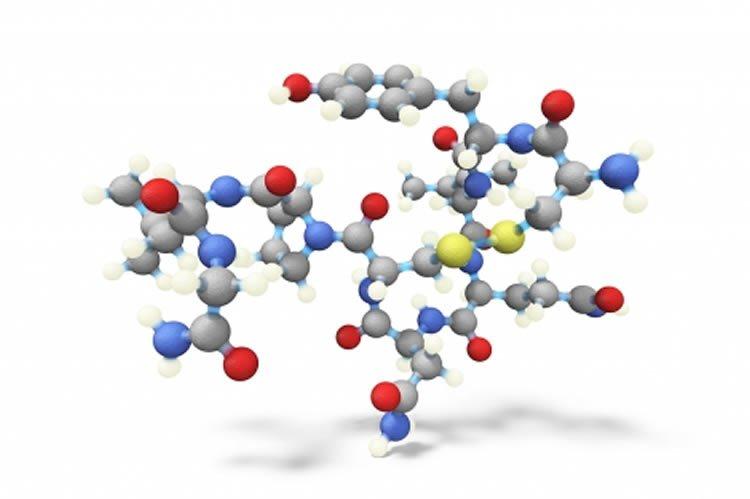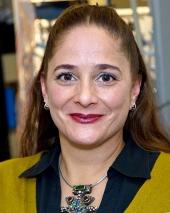By Robin Marks | Originally published on UCSF News
Nightmares. Obsessive thoughts. Avoiding particular places. Sudden outbursts. Fearing you’re in danger. Survivor guilt.
These experiences – manifestations of post-traumatic stress disorder (PTSD) – are part of life for up to 1 in 3 U.S. combat veterans and active military personnel. That’s more than triple the prevalence of PTSD in the population at large. About two-thirds of those with PTSD struggle with alcohol abuse.
A new trial may hold new hope for these military personnel through treatment with oxytocin, sometimes referred to as the “love hormone.”

Oxytocin, present in both women and men, plays a role in social behavior, trust, empathy, and managing stress and anxiety.
A shift in thinking
It’s no surprise that the threat or actuality of battle takes a psychological toll. What is surprising, are changes that Jennifer Mitchell, PhD, associate professor in neurology and psychiatry, and director of the UCSF Institute for Translational Neuroscience, has found in the U.S. military’s attitude toward the condition, and its willingness to experiment in order to help troubled soldiers.
“It used to be that when an officer was experiencing this kind of thing, they were simply excused from the military,” said Mitchell, whose work focuses on PTSD and substance abuse. “Now they’re coming to accept that this is happening to many career personnel, and the military wants to keep these active duty people going. It’s an entirely new development philosophically.”

Jennifer Mitchell, PhD
That shift is allowing Mitchell to test the potential of oxytocin, a hormone released during sex, childbirth and lactation as a treatment for PTSD and substance abuse among active military personnel. Oxytocin, present in both women and men, plays a role in social behavior, trust, empathy, and managing stress and anxiety. Its qualities have drawn researchers to the hormone, which is showing promise as a treatment for autism and schizophrenia.
“It helps with several conditions because they all involve similar stress responses,” said Mitchell, who has published findings about oxytocin for substance abuse with colleague and assistant professor of psychiatry Josh Woolley, MD, PhD. “Our thinking is that oxytocin can also help mitigate the stress response induced by trauma, and therefore keep particular behaviors at bay.”
Complex results around bonding
When she proposed giving oxytocin, which has been variously dubbed the “love hormone,” the “moral molecule,” and the “cuddle chemical,” to active duty personnel, “there was some concern about whether it would affect their ability to perform,” said Mitchell. “The answer is no. But the question arises because oxytocin is kind of misunderstood.”
The hormone does make people feel bonded to others, she said, but the effects are more complex.
“It defines how we draw our circles of ‘us’ and ‘them,’” said Mitchell, noting that for military officers who’ve been through trauma, the circle of “us” can become very small – a factor that contributes to their stress.
Mitchell’s hope is that oxytocin will allow military personnel dealing with PTSD to broaden their “us” circles. If she’s right, the hormone could temper their stress responses, and allow them to better control their PTSD symptoms and alcohol abuse that arises from them.
Mitchell is beginning a clinical trial to test her ideas at a mental health facility at Fort Gordon in Augusta, Ga. She’ll work with about 65 volunteers, initially giving patients single doses of oxytocin and then subjecting them to a stress test.
If oxytocin ameliorates the stress response, Mitchell said, the implications go way beyond the military. “The amount of money spent managing the fallout of PTSD and substance abuse in our whole society is enormous,” she said. “We’re hoping we can address that by bringing an overlooked, cheap, accessible drug into use for the public.”
About UCSF Psychiatry
The UCSF Department of Psychiatry and the Langley Porter Psychiatric Institute are among the nation's foremost resources in the fields of child, adolescent, adult, and geriatric mental health. Together they constitute one of the largest departments in the UCSF School of Medicine and the UCSF Weill Institute for Neurosciences, with a mission focused on research (basic, translational, clinical), teaching, patient care and public service.
UCSF Psychiatry conducts its clinical, educational and research efforts at a variety of locations in Northern California, including UCSF campuses at Parnassus Heights, Mission Bay and Laurel Heights, UCSF Medical Center, UCSF Benioff Children's Hospitals, Zuckerberg San Francisco General Hospital and Trauma Center, the San Francisco VA Health Care System and UCSF Fresno.
About the UCSF Weill Institute for Neurosciences
The UCSF Weill Institute for Neurosciences, established by the extraordinary generosity of Joan and Sanford I. "Sandy" Weill, brings together world-class researchers with top-ranked physicians to solve some of the most complex challenges in the human brain.
The UCSF Weill Institute leverages UCSF’s unrivaled bench-to-bedside excellence in the neurosciences. It unites three UCSF departments—Neurology, Psychiatry, and Neurological Surgery—that are highly esteemed for both patient care and research, as well as the Neuroscience Graduate Program, a cross-disciplinary alliance of nearly 100 UCSF faculty members from 15 basic-science departments, as well as the UCSF Institute for Neurodegenerative Diseases, a multidisciplinary research center focused on finding effective treatments for Alzheimer’s disease, frontotemporal dementia, Parkinson’s disease, and other neurodegenerative disorders.
About UCSF
UC San Francisco (UCSF) is a leading university dedicated to promoting health worldwide through advanced biomedical research, graduate-level education in the life sciences and health professions, and excellence in patient care. It includes top-ranked graduate schools of dentistry, medicine, nursing and pharmacy; a graduate division with nationally renowned programs in basic, biomedical, translational and population sciences; and a preeminent biomedical research enterprise. It also includes UCSF Health, which comprises top-ranked hospitals – UCSF Medical Center and UCSF Benioff Children’s Hospitals in San Francisco and Oakland – and other partner and affiliated hospitals and healthcare providers throughout the Bay Area.





